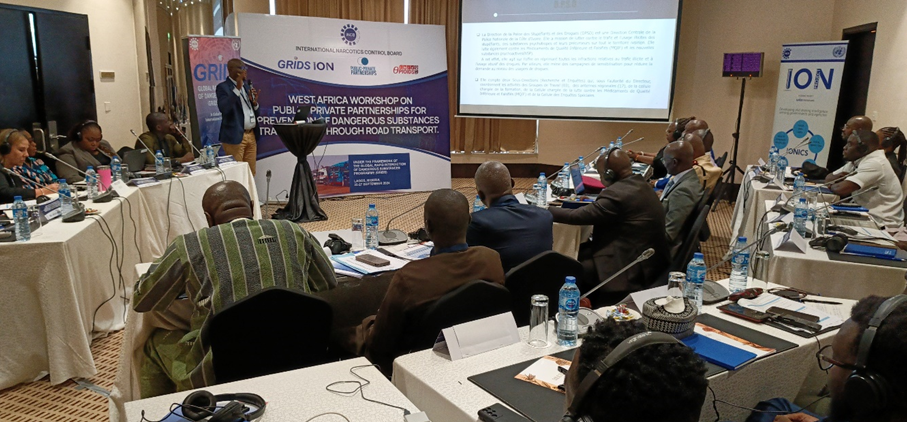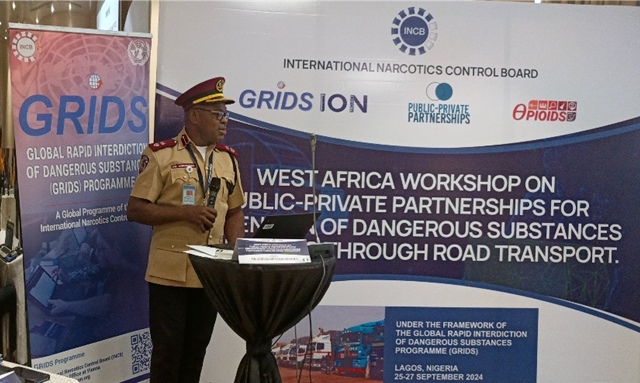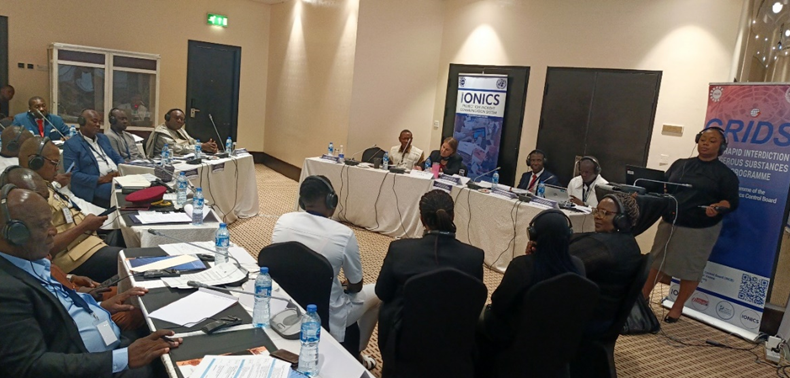West Africa Workshop Targets Trafficking of Dangerous Synthetic Drugs via Road Transport

Lagos, Nigeria, 25-27 September 2024 - The International Narcotics Control Board (INCB) Global Rapid Interdiction of Dangerous Substances (GRIDS) Programme convened a regional workshop in Lagos focused on curbing the trafficking of new psychoactive substances (NPS) and non-medical synthetic opioids through road transport in West Africa. The event gathered 22 experts, including representatives from six West African governments, nine road transport associations and companies, and three international organizations, to share insights and strategies against the rising threat of synthetic drug trafficking and dangerous NPS in the region.
Delegates from national anti-drug agencies such as Nigeria's NDLEA and NAFDAC, Benin's CILAS, Ghana's NACOC, Côte d'Ivoire's DPSD and GIRA Customs, Senegal's OCRTIS, and Sierra Leone's NDLEA, presented recent trends in NPS and synthetic opioid trafficking. Government officials highlighted the need for enhanced cooperation with road transport operators to disrupt drug trafficking routes. The United States Drug Enforcement Administration (DEA) also participated, providing an analysis of drug-related challenges in Africa and sharing recent experiences, including notable seizures of codeine in Ghana and Nigeria.

Photo: Law enforcement officers called for more collaboration with transport stakeholders on the Abidjan-Lagos route
Private road transport companies and associations contributed by voicing their commitment to support government efforts, pledging to implement security protocols and calling for regular awareness training, safe handling sessions, and joint field operations. They further agreed to share information with government agencies on emerging threats such as synthetic opioids.
Representatives from the West Africa Regional Intelligence Liaison Office of the World Customs Organization (WCO RILO), the Abidjan-Lagos Corridor Organization (ALCO), and the Economic Community of West African States (ECOWAS) also participated, emphasizing the importance of collaboration along key routes like the Abidjan-Lagos corridor. Notably, the workshop welcomed Mrs. M. Hortense, the newly appointed Executive Secretary of ALCO, and Dr. Daniel Amankwaah, Senior Officer for ECOWAS's Drugs Programme, who proposed joint operations along critical transport corridors to address the region's trafficking challenges.

Photo: Private road transport partners in West Africa discuss their contribution to counter drug trafficking
The final day of the workshop featured discussions on recommendations and the essential role of women in land transport. Four women leaders from various West African countries and roles within the road transport industry shared their experiences and discussed how their positions could contribute to preventing NPS trafficking. Ten recommendations were adopted, with one specifically focused on empowering women within the road transport sector to play an active role in anti-trafficking initiatives.
The Board's Global Rapid Interdiction of Dangerous Substances (GRIDS) Programme and Project ION and OPIOIDS Project support Governments' capacity to respond to changing trafficking, illicit manufacture, marketing and sales of NPS, non-medical synthetic opioids and fentanyl-related substances by providing real-time communication, facilitating information exchange and intelligence development that interdict distribution of dangerous substances.
The GRIDS Programme is supported by the Governments of Japan and the United States. This event was made possible through generous support from the United States of America Department of State Bureau of International Narcotics and Law Enforcement Affairs
Click here to learn more about the GRIDS Programme
Click here to learn more about the OPIOIDS Project
Click here to learn more about the Project ION